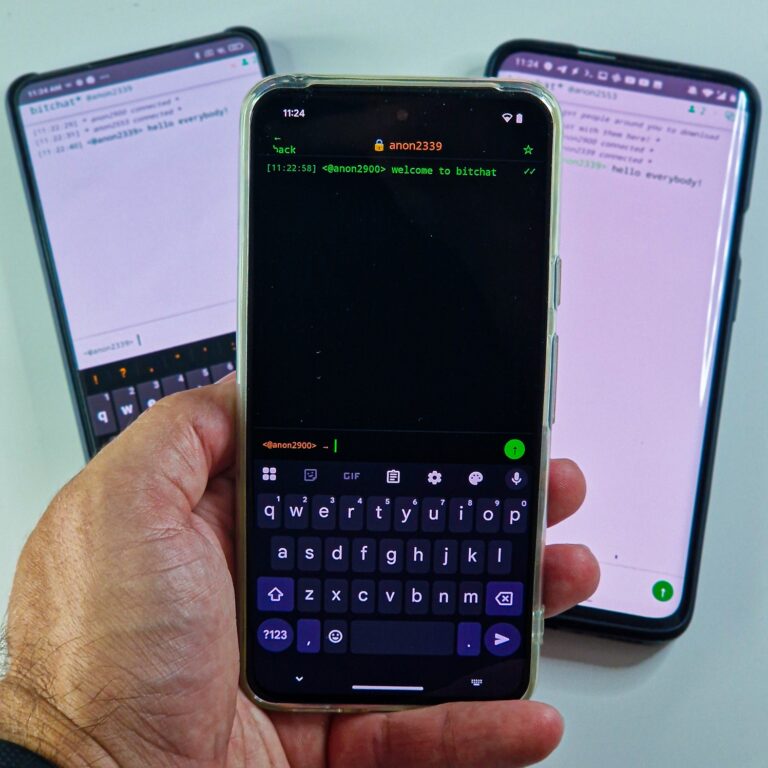![]()
Imagine a world where your messages aren’t stored on massive company servers, where you don’t need a phone number or email to chat, and where communication continues even if the internet goes down. That’s the vision behind Bitchat, a new messaging app developed by Jack Dorsey, co-founder and former CEO of Twitter (now X).
Launched on July 7, 2025, Bitchat is described by Dorsey as a “personal experiment” in alternative connectivity. Its core purpose is to keep people talking even when the internet is down, censored, or simply unavailable. Unlike traditional messaging apps, Bitchat is a peer-to-peer platform that operates entirely offline, leveraging your phone’s Bluetooth Low Energy (BLE). This decentralized approach means no third parties — no big corporations or governments — store your data, significantly reducing the risk of data leaks or hacks.
The initial beta version for iOS, launched on Apple’s TestFlight, quickly hit its 10,000-tester limit within hours, demonstrating a strong interest from curious users. While the iOS app is still undergoing review before its full release, the protocol is open-source and designed to be “platform-agnostic”. This open-source nature enabled the rapid development of an Android version, which was published on July 8, 2025 by @callebtc on GitHub. This means Bitchat now covers both major mobile operating systems, allowing iPhone and Android users to communicate with each other. Since the Bitchat is currently available only to limited iOS users, I will focus on Android platform, how to install and use it, how Mesh network works and what are advantages and disadvantages of such Bluetooth communication.
Getting Started with Bitchat on Android
If you’re an Android user willing to try Bitchat, here’s how you can download, install, and use it:
- Download the APK file from GitHub page. On your Android device, navigate to the GitHub Releases link and download the latest
.apkfile. At the time of writing, the latest working version is 0.3.
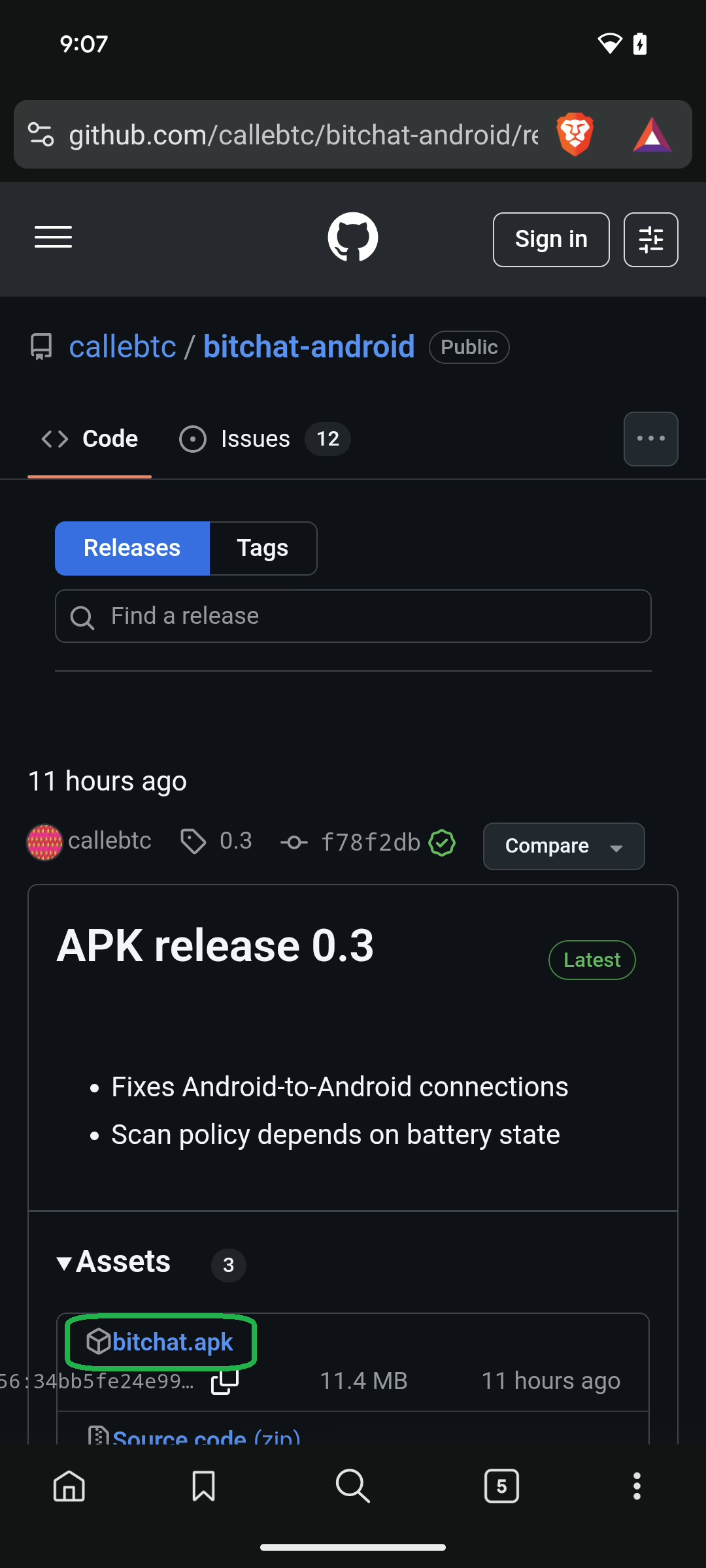
- How to Install:
- Before installing, you might need to enable your browser app to
Install unknown apps. This is necessary, since the app is not on Google Play Store. - Once enabled, open the downloaded
.apkfile to begin the installation.
- Before installing, you might need to enable your browser app to
How to Use Bitchat
After installation, launch Bitchat – it will automatically start its mesh networking. You’ll be automatically assigned with the auto-generated nickname such as @anonNNNN. The app will automatically connect to nearby iOS and Android Bitchat users. You can send messages that will be displayed to all other users in vicinity. Number of online users is visible in the top right corner.
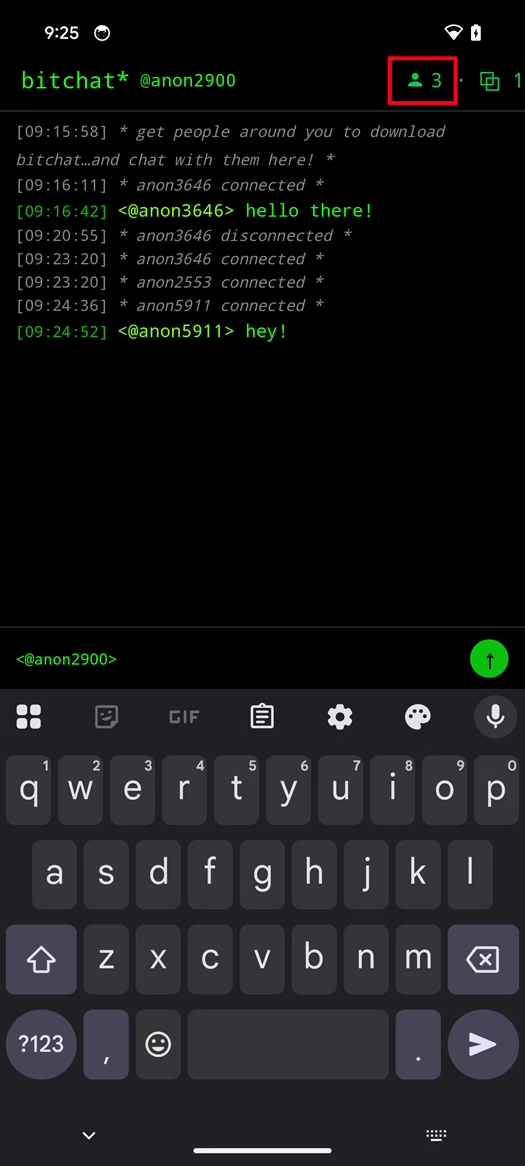
From the list of online users, you can select one and send private messages, they should hop from phone to phone until they reach the recipient.
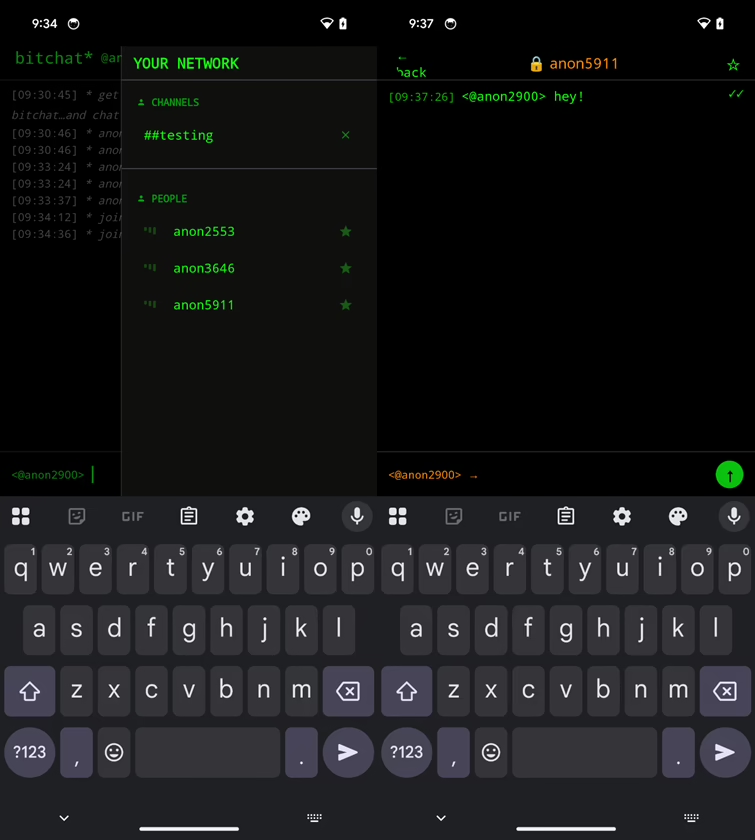
When you receive a message, you will be notified by an “envelope” in tope right corner, next to number of online users.
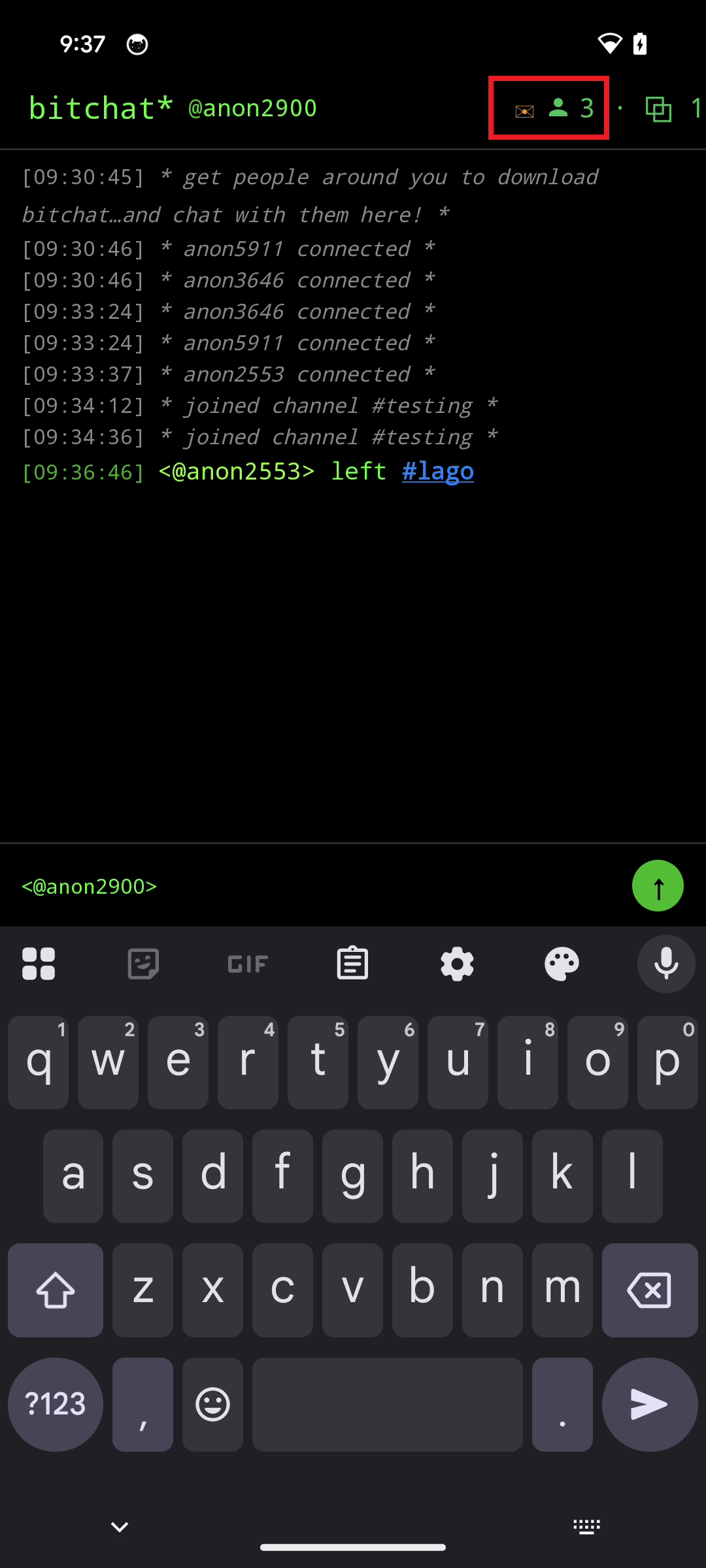
To join a group chat, use the IRC-style command /j #channel (e.g., /j #general) or simply start chatting in public. Your messages will then relay through the mesh network to reach distant peers.
From options by selecting “/” you can select commands, such as:
/j #channel - Join or create a channel
/m @name message - Send a private message
/w - List online users
/channels - Show all discovered channels
/block @name - Block a peer from messaging you
/block - List all blocked peers
/unblock @name - Unblock a peer
/clear - Clear chat messages
/pass [password] - Set/change channel password (owner only)
/transfer @name - Transfer channel ownership
/save - Toggle message retention for channel (owner only)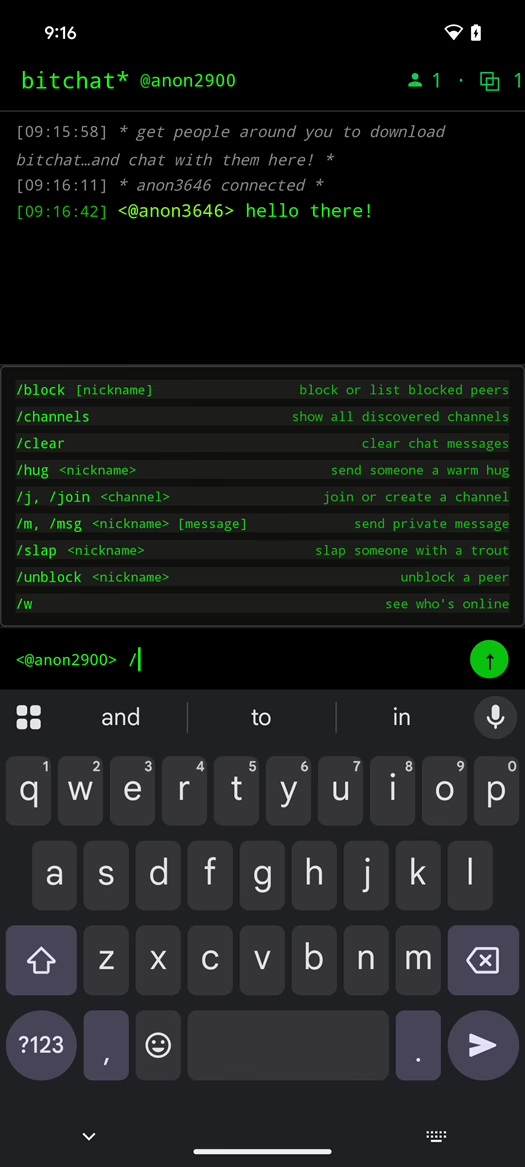
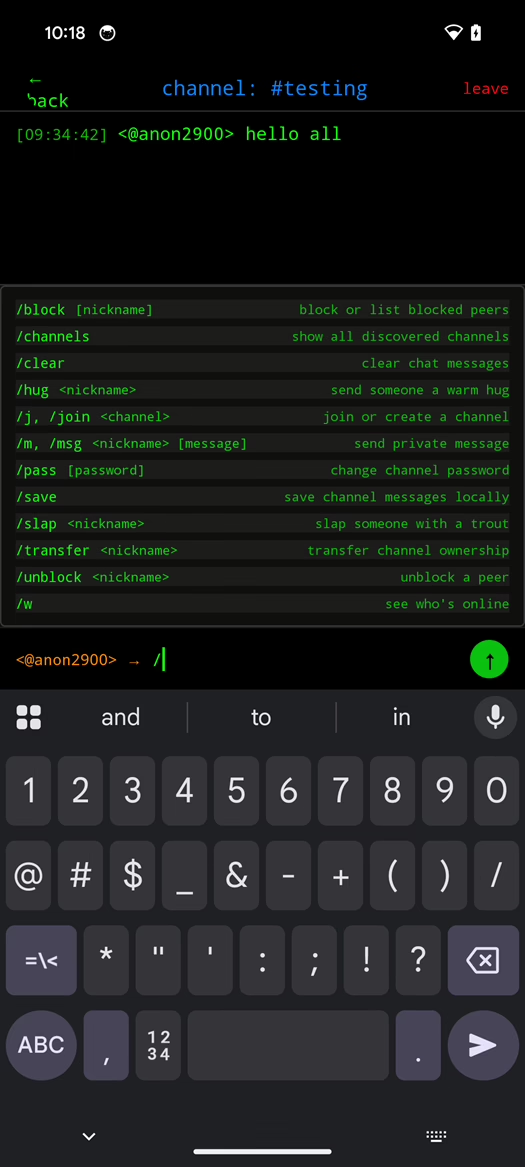
How Bluetooth Mesh Networking Works
A Bluetooth mesh network is a way for devices to connect directly to each other — like a digital game of telephone. Instead of sending messages through the internet, your phone passes them to nearby devices, which pass them along until they reach the destination.
This creates a decentralized network. Even if one device goes offline, the message can find another path. It’s like building a web of communication that doesn’t rely on cell towers or Wi-Fi.
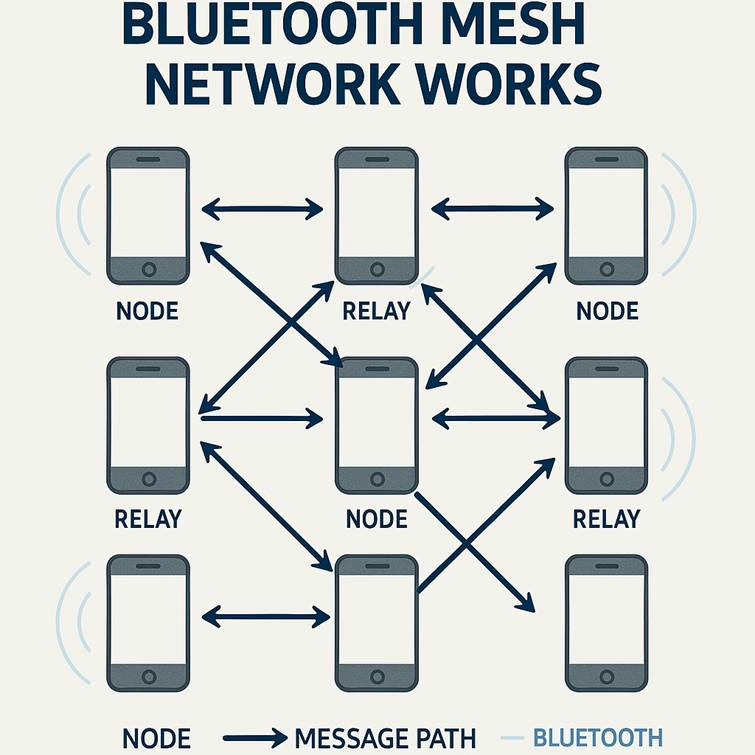
The Benefits of Decentralized Bluetooth Communication
Bitchat’s design offers several compelling advantages, particularly for privacy and resilience:
- No Internet, No Problem: This is the most obvious benefit. Whether you’re at a crowded music festival with spotty cell service, in a disaster zone where infrastructure is down, or in an area with internet censorship, Bitchat keeps you connected.
- Privacy First: Bitchat is designed with privacy at its core.
- No registration required: You don’t need to provide accounts, emails, or phone numbers. The app generates random peer IDs each time you use it, making your identity ephemeral.
- End-to-end encryption: All messages are encrypted from sender to receiver, ensuring only the intended recipient can read them.
- Local storage and ephemeral by default: Messages are stored only on your device and are designed to vanish after a short time unless channel owners enable retention. There’s no data collection or tracking by the app itself.
- Emergency Wipe: A crucial privacy feature is the “Panic Mode” or “Emergency Wipe,” which allows you to instantly clear all data from the app by triple-tapping the logo.
The Downsides to Consider
While Bitchat offers interesting possibilities, it’s important to be aware of its limitations:
- Limited Range: Bluetooth only works within about 10–100 meters. For extended range, it relies on nearby devices having the Bitchat installed as being part of mesh network.
- No Global Messaging: You can’t message someone across the world unless there’s a chain of users between you.
- Still in Development: Expect bugs and missing features as the app evolves.
Practical Use Cases for Bitchat
Bitchat is designed for scenarios where traditional communication methods fail or are compromised:
- Mass Gatherings: Ideal for music festivals, concerts, or large outdoor events where cellular networks become congested or spotty. You can easily find friends or coordinate with your group.
- Disaster Zones & Emergencies: In areas hit by natural disasters where power and internet infrastructure are down, Bitchat provides a crucial lifeline for communication and coordination among affected individuals and rescue teams.
- Protests & Activism: Similar to other Bluetooth mesh apps used in Hong Kong, Bitchat offers a secure and untraceable way for pro-democracy protesters or activists to communicate without fear of government surveillance or internet shutdowns.
- Off-Grid Adventures: For camping, hiking, or other outdoor activities where you’re deliberately off the grid, Bitchat can keep you connected with your group without needing satellite phones or other expensive gear.
- Backup Communication: It won’t replace everyday apps like WhatsApp or Signal, but Bitchat serves as an excellent backup plan if those services become unavailable.
- Overpriced internet
- School, dorms, universities communication
Alternatives
While Bitchat is gaining attention for its open-source, privacy-first approach, it’s not the only app exploring offline messaging. One notable alternative is Bridgefy – Offline Messages, available on Google Play with over 5 Million installs. Bridgefy also uses Bluetooth mesh networking to let users chat without internet or mobile data, making it popular during protests, festivals, and in areas with poor connectivity.
However, there’s a key limitation: Bridgefy requires an internet connection during the initial setup. To create an account, users must sign in using a Google or Apple ID, which introduces a dependency on centralized services — and potentially compromises the goal of full decentralization and anonymity.
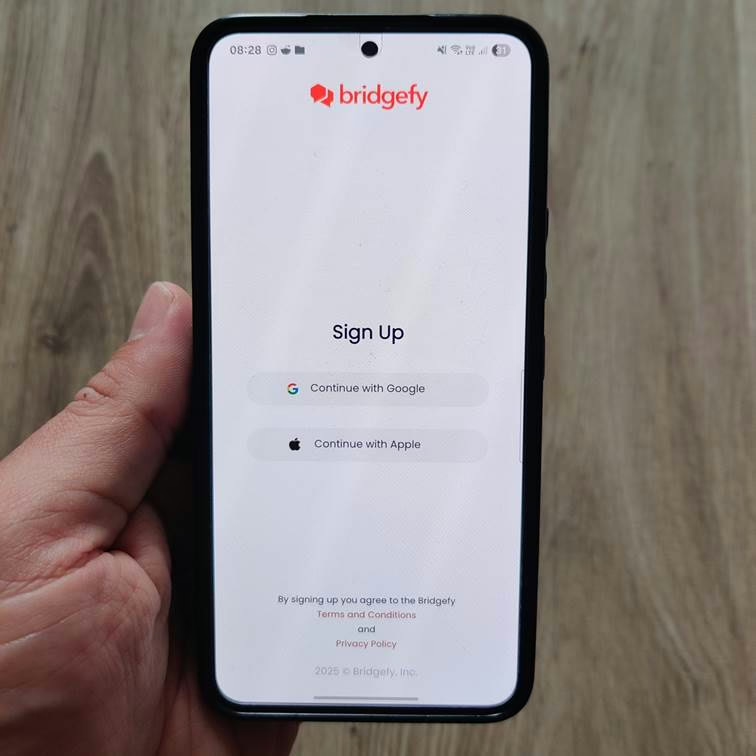
Once set up, the app works offline, but this initial step may be a dealbreaker for users seeking an independent and private communication tool.
Conclusion
In conclusion, Jack Dorsey’s Bitchat is more than just another messaging app; it’s a bold statement on decentralized, encrypted, and privacy-focused communication. By using the power of Bluetooth mesh networks, it allows people to connect directly, securely, and freely, even when the internet is out of reach.


